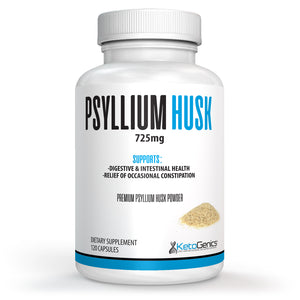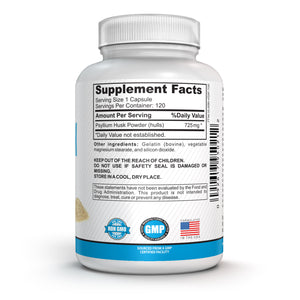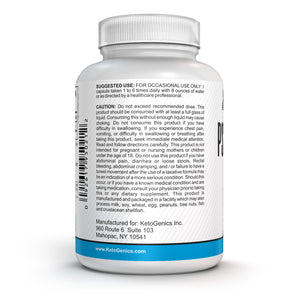Your Cart is Empty



Psyllium Husk Fiber 725mg Capsules
$17.95$26.95
Psyllium Husk Fiber 725mg
Constipation is one of the major complaints from those who follow a low carb and ketogenic diet. A ketogenic diet is very low in carbs and eliminates all grains and fruits which are high in fiber as well as severely limits amounts of vegetables one can eat on the diet. This lack of fiber can lead to constipation and Pysllium has been used for decades to treat this problem.
Pysllium works by increasing the bulk in your stool, which causes movement of the intestines. It also works by increasing the amount of water in the stool, making the stool softer and easier to pass. Psyllium also has prebiotic effects that encourage the growth of healthy bacteria in the colon. Research shows that taking psyllium is beneficial to many parts of the human body, including the heart and the pancreas.
Pysllium seed husk are indigestible and are a source of soluble dietary fiber. Many people use pysllium to reduce constipation, irritable bowel syndrome. They are also used as a regular dietary supplement to improve and maintain regular GI transit. Some recent research has shown they may be effective in lowering cholesterol and controlling certain types of diabetes.
Research has shown that taking soluble fiber can help people manage their cholesterol levels. One study shows that at least 6 weeks of daily psyllium intake is an effective way for people who are obese or overweight to lower their cholesterol with very few side effects.
Benefits of Psyllium Fiber
Below is a list of possible benefits of pysllium according to medlineplus.gov.
Possibly effective for.:
• Diabetes. Psyllium's maximum effect on the blood sugar levels occurs when psyllium is mixed with or taken with foods. In addition to lowering blood sugar, psyllium seed husk also lowers cholesterol in people with diabetes who have high cholesterol. Some studies show psyllium can lower total cholesterol by about 9%, and LDL cholesterol by 13%.
• Diarrhea. Taking psyllium by mouth seems to reduce diarrhea symptoms.
• Hemorrhoids. Taking psyllium by mouth seems to relieve bleeding and pain in people with hemorrhoids.
• High blood pressure. Taking psyllium by mouth, alone or in combination with soy protein, seems to lower blood pressure in adults.
• Irritable bowel syndrome (IBS). While not all studies agree, there is evidence that psyllium seed husk can relieve constipation and improve abdominal pain, diarrhea, and overall well-being. It may take up to four weeks of treatment to get the best results.
• Obesity. While not all studies agree, there is early evidence that psyllium might reduce body weight and appetite in people who are overweight or obese.
• Inflammatory bowel disease (ulcerative colitis). There is some evidence that taking psyllium seeds by mouth might be effective for preventing a relapse of inflammatory bowel disease. Psyllium also appears to relieve symptoms of this condition.
Each capsule contains 725mg of Psyllium Husk Powder (hulls)
Suggested use for occasional use only: 1 to 3 capsules twice daily with 8 ounces of water or as directed by a healthcare professional.
References:
Anderson, J. W.; Zettwoch, N; Feldman, T; Tietyen-Clark, J; Oeltgen, P; Bishop, C. W. (1988). "Cholesterol-lowering effects of psyllium hydrophilic mucilloid for hypercholesterolemic men". Archives of Internal Medicine. 148 (2): 292 6. doi:10.1001/archinte.1988.00380020036007. PMID 3277558.
Anderson, J. W.; Allgood, L. D.; Turner, J; Oeltgen, P. R.; Daggy, B. P. (1999). "Effects of psyllium on glucose and serum lipid responses in men with type 2 diabetes and hypercholesterolemia". The American Journal of Clinical Nutrition. 70 (4): 466–73. PMID 10500014.
Nutrients. 2013 Apr; 5(4): 1417–1435. Published online 2013 Apr 22. Fiber and Prebiotics: Mechanisms and Health Benefits doi: 10.3390/nu5041417 PMCID: PMC3705355
British Journal of Nutrition, Volume 105, Issue 1. January 2011, pp. 90-100
The effect of a fibre supplement compared to a healthy diet on body composition, lipids, glucose, insulin and other metabolic syndrome risk factors in overweight and obese individuals. DOI: http://dx.doi.org/10.1017/S0007114510003132
Pereira, M. A., O’Reilly, E., Augustsson, K., Fraser, G. E., Goldbourt, U., Heitmann, B. L. … Ascherlo, A. (2004, February 23). Dietary fiber and risk of coronary heart disease. (n.d.). JAMA Internal Medicine, 164(4), 370-376. Retrieved from http://archinte.jamanetwork.com/article.aspx?articleid=216689
Rodríguez-Morán, M., Guerrero-Romero, F., & Lazcano-Burciaga, G. (1998, September-October). Lipid- and glucose-lowering efficacy of Plantago psyllium in type II diabetes. Journal of Diabetes and its Complications, 12(5), 273-278. Retrieved from http://www.sciencedirect.com/science/article/pii/S1056872798000038
Sebely, P., Alireza, K., Colin, B., Satvinder, D., Ellis, V. (2010, August 23). The effect of a fibre supplement compared to a healthy diet on body composition, lipids, glucose, insulin and other metabolic syndrome risk factors in overweight and obese individuals. British Journal of Nutrition, 105(1), 90-100. Retrieved from http://journals.cambridge.org/action/displayAbstract?fromPage=online&aid=7948457&fileId=S0007114510003132
Sierra, M., García, J. J., Fernández, N., Diez, M. J., & Calle, A. P. (2002). Therapeutic effects of psyllium in type 2 diabetic patients. European Journal of Clinical Nutrition, 56(9), 830-842. Retrieved from http://europepmc.org/abstract/MED/12209371
Singh, B. (2007, April 4). Psyllium as therapeutic and drug delivery agent. International Journal of Pharmaceutics, 334(1-2), 1-14. Retrieved from http://www.sciencedirect.com/science/article/pii/S0378517307000610
Ziai, S. A., Larijani, B., Akhoondzadeh, S., Fakhrzadeh, H., Dastpak, A., Bandarian, F. … Emami, T. (2005, November 14). Psyllium decreased serum glucose and glycosylated hemoglobin significantly in diabetic outpatients. Journal of Ethnopharmacology, 102(2), 202-207. Retrieved from http://www.sciencedirect.com/science/article/pii/S0378874105003983








